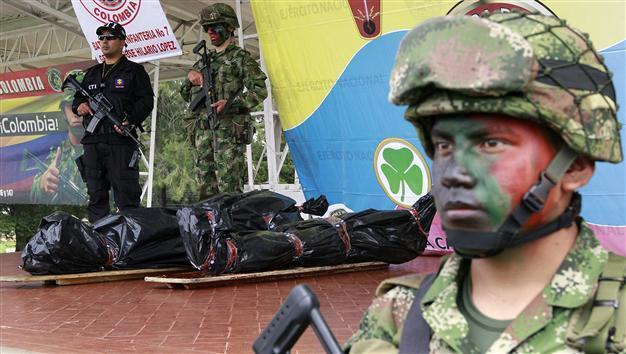Colombia government takes big step for peace
BOGOTA

Soldiers guard the bodies FARC militants after they arrived at a military base in Popayan. The Colombian government said it is ready to talk with ELN. REUTERS photo
Colombia said Aug.29 it was ready to start negotiating with its second-largest militant group, the National Liberation Army, potentially broadening a peace process aimed at ending Latin America’s oldest insurgency.At the same time, the country’s Constitutional Court provided more enticement for militants to stop fighting and end nearly 50 years of bloodshed, ruling that fighters who lay down arms can take part in politics after a peace process is completed.
The ruling endorsed a constitutional amendment that lawmakers approved in 2012.
An estimated 600,000 people have died, and another 4.5 million are displaced within the country because of the violence. ”This is an extremely important step in the desire that all Colombians have, which is a country at peace,” said President Juan Manuel Santos, alluding to the court ruling.
But FARC balked, saying the reform was unilateral and did not include their input.
Praise to release of Canadian hostage
In a statement, Santos hailed the National Liberation Army’s release this week of a Canadian hostage and said “the government is ready to start a dialogue with the ELN as soon as possible.” He had made talks with the militants, known in Spanish as the ELN, contingent on the release of captives. Top ELN commander Nicolas Rodriguez said in comments on the group’s website ahead of the release that it was a “humanitarian act” that he hoped would be seen as a “contribution for peace in Colombia.” Santos had said last week that Jernoc Wobert’s release would be a step in the right direction to starting talks between Bogota and the ELN, which has some 2,500 fighters. The ELN has been fighting the government since 1964 when radical Catholic priests inspired by the Cuban revolution took up arms in a bid to overthrow the government.
Since November, the Santos government has been engaged in talks with the country’s largest militant group FARC. The talks have taken place in Cuba. Before the negotiations started, the FARC renounced kidnappings and freed its last police and military hostages in April of last year. The reform allowing militants who disarm to take part in politics has strings attached. For instance, weapons have to by physically turned over and systematic war crimes and crimes against humanity must be probed and prosecuted, the Constitutional Court said. The president has said this reform is the legal basis for the talks with the FARC.
Most FARC leaders have been convicted in absentia of one crime or another. Santos wants a peace accord by the end of the year. He said seeing militants convicted of terrorism transformed into politicians will be hard to digest for some Colombians but they have to give up something in the interest of peace. Peace with the ELN and FARC, which have both made doing business in Colombia risky would cement huge security gains over the last decade and help attract more investment to the $330 billion economy.
















